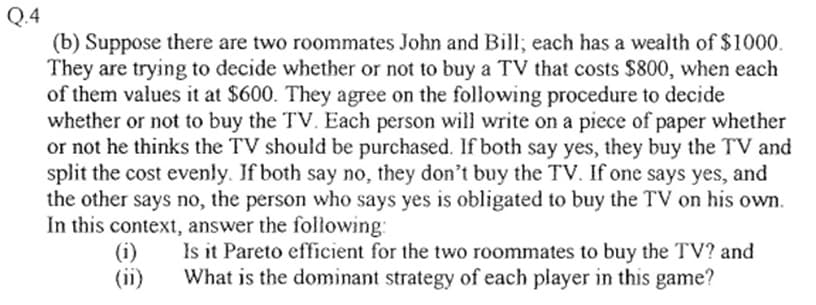(b) Suppose there are two roommates John and Bill; each has a wealth of $1000. They are trying to decide whether or not to buy a TV that costs $800, when each of them values it at $600. They agree on the following procedure to decide whether or not to buy the TV. Each person will write on a piece of paper whether or not he thinks the TV should be purchased. If both say yes, they buy the TV and split the cost evenly. If both say no, they don't buy the TV. If one says yes, and the other says no, the person who says yes is obligated to buy the TV on his own. In this context, answer the following: (i) Is it Pareto efficient for the two roommates to buy the TV? and What is the dominant strategy of each player in this game? (ii)
(b) Suppose there are two roommates John and Bill; each has a wealth of $1000. They are trying to decide whether or not to buy a TV that costs $800, when each of them values it at $600. They agree on the following procedure to decide whether or not to buy the TV. Each person will write on a piece of paper whether or not he thinks the TV should be purchased. If both say yes, they buy the TV and split the cost evenly. If both say no, they don't buy the TV. If one says yes, and the other says no, the person who says yes is obligated to buy the TV on his own. In this context, answer the following: (i) Is it Pareto efficient for the two roommates to buy the TV? and What is the dominant strategy of each player in this game? (ii)
Principles of Microeconomics
7th Edition
ISBN:9781305156050
Author:N. Gregory Mankiw
Publisher:N. Gregory Mankiw
Chapter22: Frontiers Of Microeconomics
Section: Chapter Questions
Problem 6PA
Related questions
Question
100%

Transcribed Image Text:Q.4
(b) Suppose there are two roommates John and Bill; each has a wealth of $1000.
They are trying to decide whether or not to buy a TV that costs $800, when each
of them values it at $600. They agree on the following procedure to decide
whether or not to buy the TV. Each person will write on a piece of paper whether
or not he thinks the TV should be purchased. If both say yes, they buy the TV and
split the cost evenly. If both say no, they don't buy the TV. If one says yes, and
the other says no, the person who says yes is obligated to buy the TV on his own.
In this context, answer the following:
(i)
Is it Pareto efficient for the two roommates to buy the TV? and
What is the dominant strategy of each player in this game?
(ii)
Expert Solution
This question has been solved!
Explore an expertly crafted, step-by-step solution for a thorough understanding of key concepts.
Step by step
Solved in 2 steps

Knowledge Booster
Learn more about
Need a deep-dive on the concept behind this application? Look no further. Learn more about this topic, economics and related others by exploring similar questions and additional content below.Recommended textbooks for you

Principles of Microeconomics
Economics
ISBN:
9781305156050
Author:
N. Gregory Mankiw
Publisher:
Cengage Learning

Principles of Economics, 7th Edition (MindTap Cou…
Economics
ISBN:
9781285165875
Author:
N. Gregory Mankiw
Publisher:
Cengage Learning


Principles of Microeconomics
Economics
ISBN:
9781305156050
Author:
N. Gregory Mankiw
Publisher:
Cengage Learning

Principles of Economics, 7th Edition (MindTap Cou…
Economics
ISBN:
9781285165875
Author:
N. Gregory Mankiw
Publisher:
Cengage Learning
